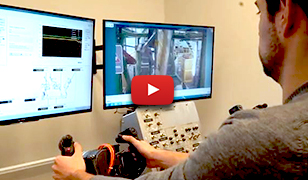Our research teams have joined many networks and research institutions. Furthermore, our department leads their creation and development.
Transmedtech Institute

The mission of the TransMedTech Institute is to develop next-generation medical technologies for the diagnosis, prognosis, treatment, and rehabilitation of three major groups of diseases: cancer, cardiovascular illnesses and musculoskeletal disorders.
Institute of Innovation and Conception in Aerospace at Polytechnique (IICAP)

The Institute of Innovation and Conception in Aerospace at Polytechnique contributes to the development and competitiveness of the Aerospace Industry in Quebec by supplying companies with qualified engineers, capable of responding to their needs in innovation and conception. The institute offers:
- To all undergraduate students, in all programs at Polytechnique, the opportunity to do internships or projects at one of the many aeronautics firms in the Montreal area.
- To all graduate students (Master’s and Ph.D.), the opportunity to use their knowledge and further their training by participating in concrete projects of conception and innovation, proposed by one of our industrial partners in the Aerospace Industry.
- To all professors, the opportunity to do a sabbatical or an internship at one of these aerospace firms.
- Conferences, courses and industrial visits to give students an in-depth knowledge of the industry.
The participating firms are Bell Helicopter, Bombardier Aerospace, CAE, CMC Electronics, MDA, Herous Devtek, Pratt & Whitney Canada, Rolls-Royce, Thales and so on.
Students at Polytechnique acquire knowledge that is adapted to the needs of the industry, thanks to: internship or academic projects (500 to 700 work hours in the Aerospace Industry), additional training periods in industrial applications; industrial visits and scientific conferences.
Research Facilities
If you work in our department as a student, a trainee or a professor, you will have access to advanced and unique tools in Mechanical Engineering and Aerospace Engineering. The department is also rich in facilities for active learning and working situations.
You are free to contact or ask any laboratory to share those facilities for co-operation, rental or analysis. For a complete directory, please visit this website.
BREEDING GROUND FOR PROJECTS
PolyFab is a community workshop, dedicated to creation and entrepreneurship. PolyFab is open to everyone.
Since 2016, creators have access to equipment, documents, tutorials, and coaching. Mostly, members have their own space for information exchange in the best practice community.
- Visit their website ...
teaching and learning in aerospace
“Life-size” training in aerospace technologies
In 2008 Polytechnique Montréal was the first university in Québec to offers a bachelor in aerospace engineering.
Eight years later, in 2016, our department and Polytechnique Montréal, welcomed a unique lab in North America: the Laboratoire d’enseignement des systèmes intégrés en aérospatiale du Québec (LESIAQ). The lab is implanted into a hangar at the École des métiers de l’aérospatiale de Montréal (EMAM).

LESIAQ is a 10,000-square-foot laboratory and its focus on integration is unique. The laboratory is equipped with a genuine integrated test bed (Iron Bird) for a Bombardier Challenger 300 Business Aircraft. This platform contains all the aircraft’s on-board hydraulic, electric and electronic systems. Furthermore, students have access to the test cell of a Bell 427 helicopter, as well as the simulation platform from CAE, making it possible to integrate the operations of the physical and simulated modules of an aircraft.
With LESIAQ, our department provides a strong platform for research excellence and experiential learning in Aerospace.
Showpiece: the airplane
The LESIAQ isn't only a lab (10 000 square feet!). It's a teaching and integration room with a genuine integrated test bed (Iron Bird) from a Bombardier Challenger 300 business aircraft. This platform contains all the aircraft’s onboard hydraulic, electric and electronic systems.
The Challenger 300 testbed will make it possible for students to observe and test the behaviour of various components of control systems for all flight configurations. They will be able to conduct tests in real-world industry conditions and get acquainted with test and certification methods practiced by aviation firms.
Simulation-based learning
Furthermore, LESIAQ integrates a simulation platform from CAE, which integrates the operations of the physical and simulated modules of an aircraft. CAE will supply specialized personnel and financial resources to support LESIAQ, as well as some modelling and simulation software licences.
Finally, this unique infrastructure has also added the test cell of a Bell 427 helicopter!
Academic courses in LESIAQ (in french)
- AER2400 : Résistance de structures aéronautiques
- AER4121 : Investigation et expérimentation en génie aérospatial
- MEC2405 : Résistance des matériaux II
- MEC2420 : Dynamique de l'ingénieur
- AER2430 : Vibrations et systèmes aéronautiques
- AER1200 : Caractéristiques des aéronefs (visites)
Guided tour
The LESIAQ :
aerospace
The simulation platform from CAE integrates the operations of the physical and simulated modules of an aircraft. The platform is a part of LESIAQ.
WATER FLOW
The Laboratoire Expérimental Grande Hauteur (LEGH) will be three stories high. We install a hydraulic loop so that pressure could be controlled to study cavitation and oxygenation of water. Furthermore, with all that space, the laboratory will welcome an optical fibre drawing tower for the Department of Engineering Physics.
ADVANCED MATERIALS FOR AEROSPACE
The laboratory for multiscale (LM2) hosts more than $2M worth of additional manufacturing infrastructure located in prime space at the Joseph-Armand Bombardier building. LM2 also hosts more than $4M worth of mechanical testing equipment in Polytechnique’s main building, in the newly renovated laboratory space, thanks to a $3M investment from the government of Québec. LM2 is maintained by research associates that provide training and support to the students.
⇒ Take a look with a virtual tour
The Laboratory for Acoustics and Vibration Analysis (LAVA) brings together talented women and men who work closely with local and international industries to create value and promote technological transfer in leading-edge fields such as aviation, road and rail transport, nuclear energy, and professional athletic equipment.
⇒ Take a look with a virtual tour




